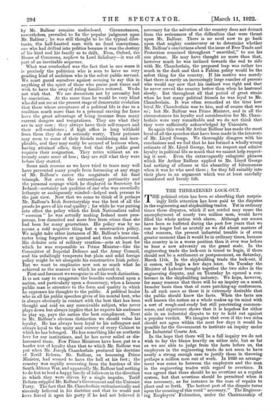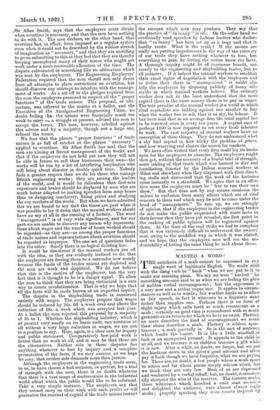THE THREATENED LOCK-OUT.
THEpolitical crisis has been so absorbing that surpris- ingly little attention has been paid to the disputes in the engineering and shipbuilding trades. Yet in ordinary times these disputes, which if not settled may cause the unemployment of nearly two million men, would have filled the whole nation with alarm. Although our senses have been so buffeted during the past few years that we can no longer feel as acutely as we did about matters of vital concern, the present industrial trouble is of even greater moment than it would be in ordinary times, because the country is in a worse position than it ever was before to bear a new adversity on the grand scale. In the engineering trade the lock-out is timed to begin, if there should not be a settlement or postponement, on Saturday, March 11th. In the shipbuilding trade the lock-out, if it comes, will begin a few days later. On Tuesday the Minister of Labour brought together the two sides in the engineering dispute, and on Thursday he opened a con- ference in the shipbuilding industry. We hope, however, for many reasons that there will be an inquiry on a much broader basis than that of mere patching-up conferences. In all such cases as these it is extremely desirable that the public should know the facts. When the facts are well known the nation as a whole makes up -its mind with a sort of rough-and-ready but still penetrating common- sense, and experience shows that it is hopeless for either side in an industrial dispute to try to hold out against a popular verdict. We imagine that even if the two sides should not agree within the next few days it would be possible for the Government to institute an inquiry under the Industrial Courts Act.
In the hope that there will be a full inquiry we do not wish to lay the blame heavily on either side, but so far as we are able to judge from the facts before us, the employers in the engineering trade do not seem to have nearly a strong enough case to justify them in throwing perhaps a million men out of work. In 1920 an arrange- ment was come to between the employers and the men in the engineering trades with regard to overtime. It was agreed that there should be no overtime as a regular system, but that overtime should be permitted when it was necessary, as for instance in the case of repairs to plant and so forth. The hottest part of the dispute turns upon the meaning of this word" necessary." The Engineer- ing Employers' Federation, under the Chairmanship of .Sir Allan Smith, says that the employers must decide when overtime is necessary, and that the men have nothing to do with it. The men declare, on the other hand, that overtime has, in effect, been imposed as a regular system even when it could not be described by the wildest stretch of imagination as "necessary," and that they are unwilling to go on submitting to this as they feel that they are thereby keeping unemployed many of their mates who might get work under a more reasonable allocation of the time. The dispute culminated in something like an ultimatum which was sent by the employers. The Engineering Employers' Federation required that the men should not only desist from all attempts to place restrictions on overtime, but should disavow any attempt to interfere with the manage- ment of works. As a set off to the pledges required from the men the employers promised to respect all the " proper functions" of the trade unions. This proposal, or ulti- matum, was referred to the unions at a ballot, and the Executive of the Amalgamated Engineering Union, no doubt feeling ha'; the unions were financially much too weak to carry on a struggle at present, advised the men to accept the terms. The men, however, rebelled against this advice and by a majority, though not a large one, refused the terms.
We fear that the phrase "proper functions" of trade unions is as full of catches as the phrase " necessary " applied to overtime. Sir Allan Smith has said that the men are aiming at Soviet management of the works, and that if the employers do not hold out now they will not be able in future to call their businesses their own—the works will be run by a lot of interfering busybodies who will bring about disaster in double quick time. Nobody feels a greater respect than we do for those who manage British engineering works ; they are among the leaders of the world, and it would be ridiculous that first-rate experience and brains should be displaced by men who are much better adapted to making speeches from soap boxes than to designing machinery, fixing prices and studying the coy markets of the world. But when we have admitted this we are bound to say that the times are past when it was possible to lay it down that the manual workers should have no say at all in the running of a factory. The word " management " is of very wide significance, and for our part we are unable to discover any reason why representa- tions about wages and the number of hours worked should be regarded—as they are—as among the proper functions of trade unions and representations about overtime should be regarded as improper. The one set of questions fades into the other. Surely there is no logical dividing line. It would be disastrous if the manual workers ran off with the idea, as they are evidently inclined to do, that the employers are forcing them to a surrender now merely because the funds of the trades unions are depleted and the men are weak and dispirited. We do not believe that this is the motive of the employers, but the very fact that it is thought to be is a danger signal. To allow the men to think that they are being victimized is a sure way to create revolutionaries. That is why we hope that all the facts will be made known at an impartial inquiry.
The dispute in the shipbuilding trade is concerned entirely with wages. The employers propose that wages should be reduced by 26s. 6d. a week over and above the reduction of 18s. -a week which was accepted last year. At a ballot the men rejected this proposal by a majority of 10 to 1. Whether the shipbuilding industry, which is at present very nearly on its beam ends, can continue at all without a very large reduction in wages, we are not in a position to say. Here, again, is a clear case for inquiry and public statement. Comparatively low-paid work is better than no work at all, and it may be that these are the alternatives. Neither side in these disputes has anything whatever to lose by inquiry and a complete presentation of the facts, if we may assume, as we hope we may, that neither side demands more than justice. Although the employers in the engineering trade seem, to us, to have chosen a bad occasion, or pretext, for a trial of strength with the men, there is no doubt whatever that there is a vast range of controversies in the industrial world about which the public would like to be informed. Take a very simple instance. The employers say that they cannot carry on their work with such profits as will guarantee the renewal of capital if the trade unions restrict the amount which men may produce. They say that the practice of " ca'canny " is rife. On the other hand we continually read speeches by Labour leaders who declare that " ca canny " has been set up as a bogy and that it hardly exists. What is the truth ? If the unions are really not putting impediments in the way of the recovery of our trade they have nothing whatever to lose, but everything to gain, by letting the nation know the facts. A thorough inquiry might be of enormous benefit, not merely to the engineering and shipbuilding trades, but to all industry. If it helped the manual workers to establish their exact rights of negotiation with the employers and to define their share in " management" it would also help the employers by disposing publicly of many silly myths in which manual workers believe. The ordinary worker does not in the least understand that the more capital there is the more money there is to pay in wages. The true paradise of the manual worker is a world in which rival capitalists are bidding against one another to buy what the worker has to sell, that is to say, his labour. It has been said that in an average firm the total capital has to be renewed once in every ten years. A capital sum of perhaps £400 is now required to set every fresh labourer to work. The vast majority of manual workers have no conception of these things. They do not understand what a shy bird capital is, how tricky the problem of prices, and how wearying and elusive the search for markets. We have often wished that every firm could lay its books open for the employees to examine. The employees might then get, without the necessity of a brutal trial of strength, some inkling of that truth which was learned in dire and humiliating disaster by the Italian manual workers in Milan and elsewhere when they dispensed with their direct- ing staffs and discovered that the work of the factories came instantly to a standstill. We agree that in an effec- tive sense the employers must be "free to rim their own show." But that does not by any means condemn the unions to exclusion from many affairs which are of vital concern to them and which may be said to come under the head of "management." To sum up, we are strongly of opinion that if the employers in the engineering trades do not make the public, acquainted with more facts in their favour than they have yet revealed, the first point in the making of public opinion will be registered against them. At the time of the coal strike we had to complain that it was extremely difficult to understand the owners' case, owing to the muddled way in which it was stated, and we hope that the employers now will see the un- desirability of letting the same thing be said about them.



































 Previous page
Previous page